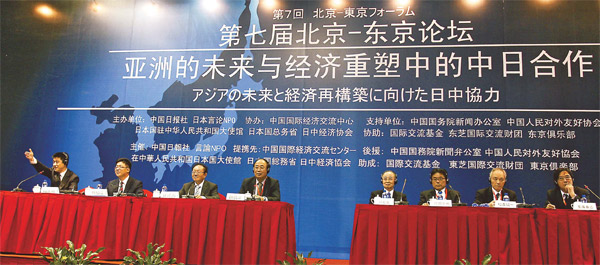'Two tigers can live on one mountain'
Updated: 2011-08-23 10:15
By Cui Haipei and Ma Liyao (China Daily)
|
|||||||||||
BEIJING - The "two tigers" in the region can coexist as long as they make efforts to be friends with each other, said Akashi Yasushi, former United Nations undersecretary-general, on Monday.
Yasushi, who is now chairman of the board of trustees of the non-profit, non-political organization, International House of Japan, stressed that Japan is geographically an Asian country, so Japan and China need to establish a crisis management mechanism as soon as possible to reduce disputes that might harm Sino-Japanese relations.
|
 |
|
From left: Gao Anming, secretary-general of the Seventh Beijing-Tokyo Forum preparatory committee and secretary-general of China Daily News Group; Yang Bojiang, professor from the University of International Relations; Wei Jianguo, secretary-general of the China Center for International Economic Exchanges; Zhao Qizheng, head of the foreign affairs committee of the Chinese People's Political Consultative Conference; Akashi Yasushi, former United Nations undersecretary-general; Hiroya Masuda, former minister of internal affairs and communications of Japan; Matsumoto Kenichi, professor from Japan's Reitaku University; and representative of Japan's Genron NPO Yasushi Kudo at the news conference on Monday. [Zhang Wei / China Daily] |
"There is a difference on how to recognize the United States' presence in the region, and this is one of the reasons why there is a lack of mutual trust between the two countries on security issues," he said.
Security dialogue is the key to developing the mutual trust that is vital to Sino-Japanese relations, and China and Japan have begun negotiations to create a maritime crisis management mechanism, which will help prevent unexpected maritime incidents soaring bilateral relations.
Such a multi-level mechanism involving national leaders, the foreign ministries, the defense ministries and think tanks will be a big boost for better relations, said Zhang Tuosheng, a researcher at the China Foundation for International and Strategic Studies.
Both China and Japan should make efforts to speed up the negotiations and the final mechanism should focus on crisis prevention more than conflict resolution, he said.
Zhang said he was optimistic about future relations, as long as China and Japan can avoid strategic misjudgments and promote mutual understanding.
"China and Japan should learn from the reconciliation between Germany and France, who were historical enemies and are now both leaders of the Europe. It shows that two tigers can live on one mountain," he said.
Ties between China and Japan deteriorated and military exchanges were suspended after the collision between a Chinese fishing boat and two Japanese patrol boats in waters off the Diaoyu Islands in the East China Sea last September.
Although it was a product of the Cold War, the US-Japan alliance has strengthened since the mid-1990s, according to Yao Yunzhu, a senior researcher with the Academy of Military Science of the People's Liberation Army, and it has had a negative impact on China's sense of security.
"The US-Japan alliance is a state affair of the two countries, and China is happy to see closer ties between the two countries if the alliance is not against China," she added.
Defense is a sensitive part of Sino-Japanese ties, and military exchanges would help deepen mutual understanding, Yao said. But she suggested the two countries begin with cooperation in less sensitive areas such as nuclear security and anti-piracy missions.
However, Ishiba Shigeru, Japan's former defense chief and now chairman of the policy council of the opposition Liberal Democratic Party, said that while Japan is willing to cooperate in areas such as search and rescue, it is unlikely to conduct military cooperation at higher levels at this stage due to constitutional reasons and it will not do so with countries other than the US.
Matsumoto Kenichi, a professor from Japan's Reitaku University, said a defense policy that only considers Japan itself is not enough given today's international situation, and Japan needs to reconsider its strategy of putting the Japan-US alliance first.
"We need to pay attention to Asia as a whole", he said, adding that people should push forward the realization of an East Asian Community.
Li Lianxing contributed to this story.
- Live Report: Gadhafi on the run as rebels fight
- More trains slow to improve safety
- Trade balance possible next year
- Time to cement China-Japan ties
- Prosecutor to drop Strauss-Kahn case
- CNPC terminates 6 overseas projects
- Trust is vital for China-Japan ties
- Live Report: Gadhafi's rule 'crumbling' in Libya
Hot Topics
Anti-Gay, Giant Panda, Subway, High Speed Train, Coal Mine, High Temperature, Rainstorm, Sino-US, Oil Spill, Zhu Min
Editor's Picks

|

|

|

|

|

|







